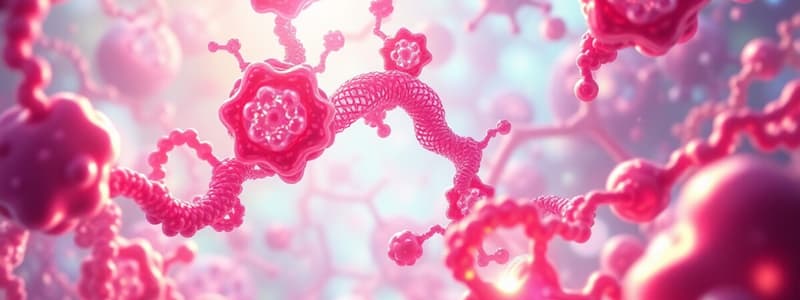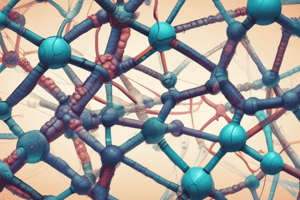Podcast
Questions and Answers
What is the primary focus of molecular biology within biochemistry?
What is the primary focus of molecular biology within biochemistry?
- Catalysts of biochemical reactions and their kinetics
- Molecular mechanisms of DNA, RNA, and protein synthesis (correct)
- Study of the molecular structure of biological macromolecules
- Chemical reactions that maintain cell life
Which of the following describes the term 'metabolism' accurately?
Which of the following describes the term 'metabolism' accurately?
- Composed solely of catabolic reactions that release energy
- Only the synthesis of molecules in living organisms
- Set of reactions that maintain the living state of cells (correct)
- An exclusive focus on the breakdown of fats and carbohydrates
In the context of enzymology, what is meant by enzyme kinetics?
In the context of enzymology, what is meant by enzyme kinetics?
- The study of the genetic codes that produce enzymes
- The regulation of energy production within cells
- A method of analyzing enzyme structure using spectroscopy
- The relationship between the concentration of substrates and the rate of reaction (correct)
Which application of biochemistry is directly involved in the production of genetic modifications in crops?
Which application of biochemistry is directly involved in the production of genetic modifications in crops?
What primary function do nucleic acids serve in living organisms?
What primary function do nucleic acids serve in living organisms?
What technique is essential for amplifying specific DNA sequences?
What technique is essential for amplifying specific DNA sequences?
How do proteins differ from carbohydrates in terms of biological function?
How do proteins differ from carbohydrates in terms of biological function?
Which aspect of biochemistry is primarily related to the interaction of cells with external signals?
Which aspect of biochemistry is primarily related to the interaction of cells with external signals?
Flashcards are hidden until you start studying
Study Notes
Biochemical Concepts
Definition
- Biochemistry is the branch of science that explores the chemical processes within and related to living organisms.
Key Areas in Biochemistry
-
Molecular Biology
- Study of the molecular mechanisms of biological processes.
- Focuses on DNA, RNA, and protein synthesis.
-
Metabolism
- Set of chemical reactions that maintain the living state of cells.
- Divided into two main categories:
- Catabolism: Breakdown of molecules to obtain energy.
- Anabolism: Synthesis of all compounds needed by the cells.
-
Enzymology
- Study of enzymes, the catalysts of biochemical reactions.
- Enzyme kinetics (rate of reactions) and regulation are key topics.
-
Structural Biology
- Focuses on the molecular structure of biological macromolecules.
- Understanding protein folding and function, nucleic acids, and complexes.
-
Signal Transduction
- The process by which cells respond to external signals.
- Involves receptors, second messengers, and various signaling pathways.
-
Genomics and Proteomics
- Genomics: Study of genomes, the complete set of genes within a cell.
- Proteomics: Study of the entire set of proteins expressed by a genome.
Important Molecules
- Carbohydrates: Sugars and starches; important for energy storage and structural components.
- Lipids: Fats and oils; critical for energy storage, signaling, and cellular structure.
- Proteins: Made up of amino acids; essential for countless biological functions.
- Nucleic Acids: DNA and RNA; responsible for storage and transmission of genetic information.
Techniques in Biochemistry
- Chromatography: Separation of compounds in mixtures.
- Electrophoresis: Method for separating macromolecules based on size and charge.
- Spectroscopy: Analysis of matter through its interaction with electromagnetic radiation.
- PCR (Polymerase Chain Reaction): Technique to amplify DNA sequences.
Applications of Biochemistry
- Medicine: Drug development, disease diagnosis, and therapeutic interventions.
- Agriculture: Genetic engineering and crop improvement.
- Biotechnology: Production of biofuels, enzymes, and bio-based products.
Interdisciplinary Connections
- Biochemistry is closely related to other fields such as:
- Molecular Genetics: Genetics at the molecular level.
- Cell Biology: Study of cellular processes and structures.
- Microbiology: Focus on microorganisms and their biochemical processes.
Biochemistry Definition
- Biochemistry is the study of chemical processes within and related to living organisms.
- It explores the molecular mechanisms that support life.
Key Areas in Biochemistry
- Molecular Biology:
- Focuses on DNA, RNA, and protein synthesis.
- Investigates how these molecules interact to carry out biological processes.
- Metabolism:
- The sum of chemical reactions occurring in living organisms.
- Includes catabolism, the breakdown of molecules for energy, and anabolism, the synthesis of cellular components.
- Enzymology:
- Study of enzymes, which are biological catalysts that speed up chemical reactions.
- Examines enzyme kinetics, the rate at which reactions occur, and how enzymes are regulated.
- Structural Biology:
- Investigates the three-dimensional structures of biological macromolecules, such as proteins and nucleic acids.
- Determines how these structures influence function and interactions within cells.
- Signal Transduction:
- The process by which cells receive and respond to external signals.
- Involves receptors that bind to signals, second messengers that relay information, and complex signaling pathways.
- Genomics and Proteomics:
- Genomics: Studies the complete set of genes within an organism.
- Proteomics: Analyses the full set of proteins expressed by a genome.
Important Molecules
- Carbohydrates:
- Sugars and starches.
- Provide energy for cells and act as structural components.
- Lipids:
- Fats and oils.
- Serve as energy stores, signaling molecules, and key components of cell membranes.
- Proteins:
- Composed of amino acids.
- Perform a vast array of functions, including catalysis, transport, signaling, and structural support.
- Nucleic Acids:
- DNA and RNA.
- Encode and transmit genetic information.
Techniques in Biochemistry
- Chromatography:
- Separates components of a mixture based on their physical and chemical properties.
- Used to isolate and purify specific molecules.
- Electrophoresis:
- Separates molecules based on their size and electrical charge.
- Commonly used to analyze DNA, RNA, and proteins.
- Spectroscopy:
- Studies the interaction of matter with electromagnetic radiation.
- Provides information about the structure and composition of molecules.
- PCR (Polymerase Chain Reaction):
- Amplifies specific DNA sequences.
- Widely used in research and diagnostics.
Applications of Biochemistry
- Medicine:
- Drug development for treating diseases.
- Disease diagnosis based on biochemical markers.
- Designing new therapies.
- Agriculture:
- Genetic engineering for crop improvement.
- Enhancing plant productivity and resistance to stress.
- Biotechnology:
- Production of biofuels from renewable sources.
- Developing bio-based products and enzymes for various industrial applications.
Interdisciplinary Connections
- Biochemistry is interconnected with other fields like:
- Molecular Genetics:
- Explores how genes are expressed and regulated at the molecular level.
- Cell Biology:
- Focuses on the structure and function of cells.
- Microbiology:
- Studies the biochemistry of microorganisms, including bacteria, viruses, and fungi.
- Molecular Genetics:
Studying That Suits You
Use AI to generate personalized quizzes and flashcards to suit your learning preferences.




